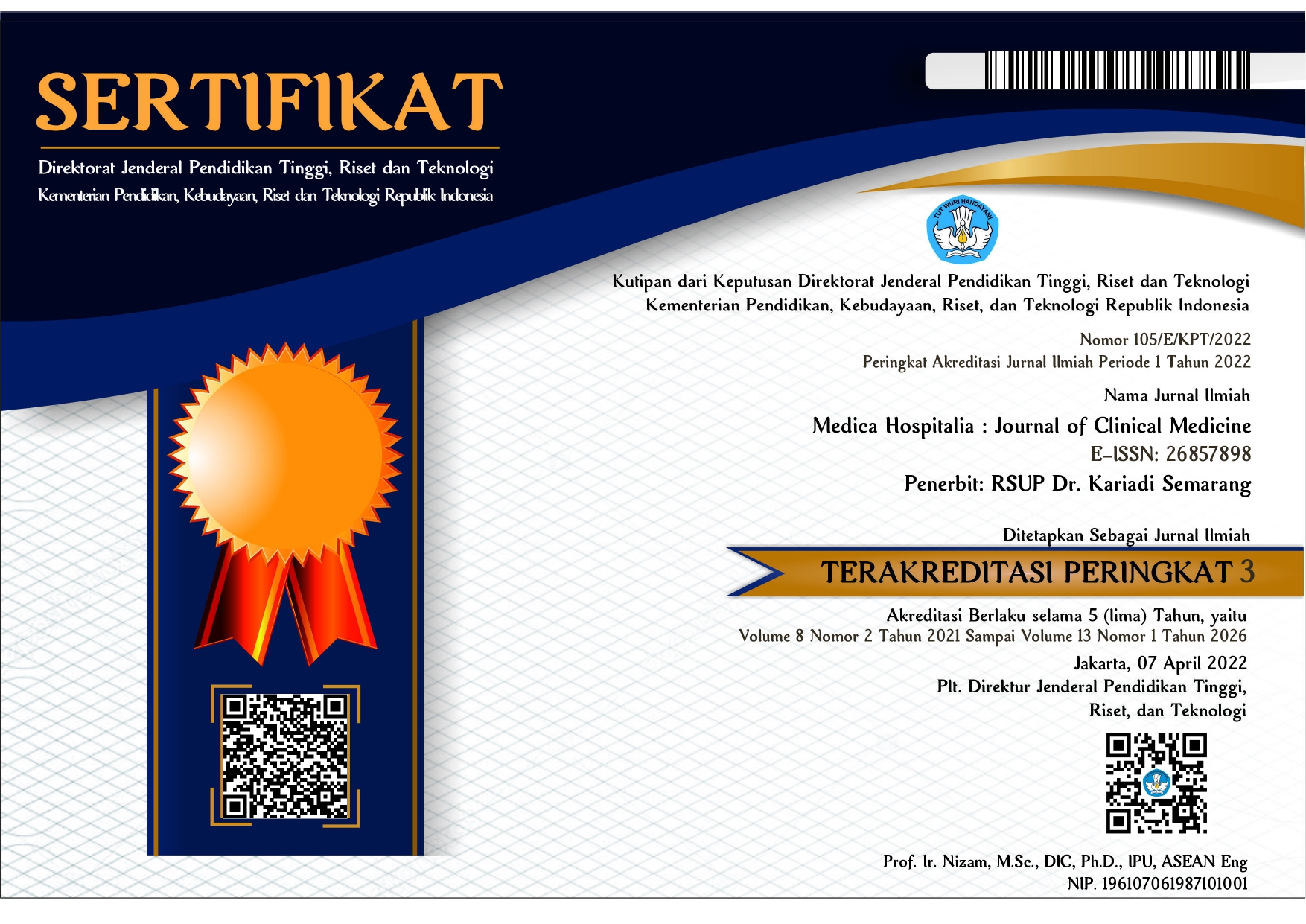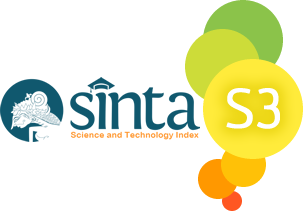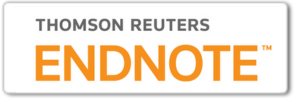Hipertensi pada Pasien Kanker Kolorektal Metastatik dengan Terapi Bevacizumab di RSUP Dr. Kariadi
DOI:
https://doi.org/10.36408/mhjcm.v7i2.502Keywords:
Kanker kolorektal, bevacizumab, hipertensiAbstract
Latar belakang: Kanker kolorektal saat ini sudah menjadi penyebab utama ketiga kematian akibat kanker di dunia, penyakit ini membutuhkan terapi yang progresif dimana salah satu terapinya adalah bevacizumab. Namun diketahui bevacizumab dapat menimbulkan hipertensi pada sebagian pasien. Penelitian ini bertujuan untuk untuk mengetahui onset terjadinya hipertensi akibat bevacizumab dengan rejimen kemoterapi apa yang digunakan.
Metode: Penelitian ini merupakan sebuah tinjauan deskriptif restrospektif yang dilakukan di RSUP Dr. Kariadi, Semarang. Kriteria inklusi terdiri dari pasien kanker kolorektal metastatik yang berusia ? 18 tahun dengan hipertensi tingkat ?2 berdasarkan NCI CTCAE version 5.0 setelah diberikan terapi bevacizumab 5 mg/kg berat badan di RSUP Dr. Kariadi. Pengambilan data dalam 1 tahun (bulan April 2018 hingga April 2019) melalui peninjauan dari rekam medis, laporan penggunaan obat bevacizumab dan laporan penggunaan obat kardiovaskuler instalasi farmasi. Kriteria ekslusi dalam penelitian ini yaitu hipertensi tingkat ?2 berdasarkan NCI CTCAE version 5.0 yang muncul setelah ?4 kali waktu paruh bevacizumab (t 1/2 = 20 hari) dari kemoterapi yang terakhir.
Hasil: Total 95 pasien sesuai kriteria, sebanyak 24 pasien (25,26%) teridentifikasi mengalami hipertensi tingkat ? 2 berdasarkan NCI CTCAE version 5.0. Dengan 20 pasien (83,33%) pasien mendapatkan kemoterapi rejimen FOLFOX4, sedangkan sisanya (16,66%) dengan rejimen de Gramont. Hipertensi ini muncul sebagian besar pada siklus III, diikuti siklus ke II, ke I dan ke VI. Tidak satupun pasien dengan kombinasi FOLFIRI yang terdeteksi mengalami hipertensi ini.
Kesimpulan: Penelitian ini menunjukkan onset munculnya hipertensi tingkat ?2 NCI CTCAE version 5.0 paling banyak adalah pada siklus awal terapi yaitu I-III dan dengan rejimen kombinasi FOLFOX4 + bevacizumab.
Kata Kunci: Kanker kolorektal, bevacizumab, hipertensi
Background: Colorectal cancer nowadays is the third leading cause of cancer deaths in the world, this disease requires progressive therapy where one of the treatments is bevacizumab. But it is known that bevacizumab can cause hypertension in some patients. This study aims to determine the onset of the hypertension with chemotherapy regimen used.
Method: This research is a retrospective descriptive review conducted at Dr. Kariadi General Hospital, Semarang. Inclusion criteria consisted of metastatic colorectal cancer patients aged ?18 years old with hypertension level ?2 based on NCI CTCAE version 5.0 after being given bevacizumab therapy dose 5 mg/kg body weight. Retrieval of data in 1 year (April 2018 to April 2019) through a review of medical records, reports on the use of bevacizumab drugs and reports on the use of cardiovascular drugs in Department of Pharmacy. The exclusion criteria in this study were hypertension level on NCI CTCAE version 5.0 which appeared after 4 times the half-life of bevacizumab (t 1/2 = 20 days) from the last chemotherapy.
Result: Total 95 patients according to the criteria, 24 patients (25.26%) were identified as having hypertension level ? 2 based on NCI CTCAE version 5.0. With 20 patients (83.33%) patients received FOLFOX4 regimen, while the rest (16.66%) with de Gramont regimen. This hypertension occurs mostly in cycle III, followed by cycle II, to I and to VI. None of the patients with a combination of FOLFIRI.
Conclusion: This research shows that the onset of hypertension level ?2 NCI CTCAE version 5.0 mostly in the initial cycle of therapy (I-III) with the FOLFOX4 + bevacizumab combination regimen.
Keywords: Colorectal cancer, bevacizumab, hypertension
Downloads
References
2. Rosen LS, Jacobs IA, Burkes RL. Bevacizumab in colorectal cancer: current role in treatment and the potential of biosimilars. Targ Oncol. 2017; 12:599–610.
3. Kazazi HF, Beinjen JH, Schellens JHM. Bevacizumab. Oncologist. 2010; 15(8): 819–825.
4. Mancuso MR, Davis R, Norberg SM, et al. Rapid vascular regrowth in tumors after reversal of VEGF inhibition. J Clin Invest. 2006; 116:2610 –2621.
5. Fernando NH, Hurwitz HI. Targeted therapy of colorectal cancer: clinical experience with bevacizumab. The Oncologist. 2004; 9: 11-18.
6. Osterlund P, Soveri LM, Isoniemi H, Poussa T, Alanko T, Bono P. Hypertension and overall survival in metastatic colorectal cancer patients treated with bevacizumab-containing chemotherapy. BJC. 2011; 104, 599 – 604.
7. Chen C, Sun P, Ye S, Weng H, Dai Q. Hypertension as a predictive biomarker for efficacy of bevacizumab treatment in metastatic colorectal cancer: A meta-analysis. JBUON. 2014; 19(4): 933-940.
8. Dewdney A, Cunningham D, Barbachano Y, Chau I. Correlation of bevacizumab-induced hypertension and outcome in the BOXER study, a phase II study of capecitabine, oxaliplatin (CAPOX) plus bevacizumab as peri-operative treatment in 45 patients with poor-risk colorectal liver-only metastases unsuitable for upfront resection. BJC. 2012; 106, 1718–1721.
9. National Cancer Institute: CTEP [Internet]. Bethesda (MD): National Institute of Health; 2017. Common Terminology Criteria for Adverse Events version 5.0; [published 2017 November 27, cited 2019 March 28]; Available from: https://ctep.cancer.gov/protocoldevelopment/electronic_applications/docs/ctcae_v5_quick_reference_8.5x11.pdf
10. Darrell H, Melissa L. Drug-Induced Hypertension. US Pharm [Internet]. 2008 [cited 2019 April 01]; 33(9): HS11-HS20. Available from: https://www.uspharmacist.com/article/drug-induced-hypertension.
11. Dionisio de Sousa IJ, Ferreira J, Rodrigues J, et al. Association between bevacizumab-related hypertension and response to treatment in patients with metastatic colorectal cancer. ESMO Open [Internet]. 2016 [cited 2019 March 20]; 1: e000045. Available from: https://esmoopen.bmj.com/content/1/3/e000045 DOI:10.1136/esmoopen-2016-000045.
12. Adamcic U, Skowronski K, Peters C, Morrison J, Coomber BL. The Effect of Bevacizumab on Human Malignant Melanoma Cells with Functional VEGF/VEGFR2 Autocrine and Intracrine Signaling Loops. Neoplasia. 2012; 14(7): 612–623.
13. Neufeld G, Cohen T, Gengrinovitch S, Poltorak Z. Vascular endothelial growth factor (VEGF) and its receptors. FASEB J. 1999; 13:9–22.
14. Zachazry I, Gliki G. Signaling transduction mechanisms mediating biological actions of the vascular endothelial growth factor family. Cardiovasc Res. 2001; 49:568–581.
15. Facemire CS, Nixon AB, Griffiths R, Hurwitz H, Coffman TM. Vascular endothelial growth factor receptor 2 controls blood pressure by regulating nitric oxide synthase expression. Hypertension [Internet]. 2009 [cited 2019 April 08]. Available from: https://www.ncbi.nlm.nih.gov/pmc/articles/PMC2746822/pdf/nihms139517.pdf DOI:10.1161/HYPERTENSIONAHA.109.129973.NIH.
16. Leon-Mateos L, Mosquera J, Anton Aparicio L. Treatment of sunitinib-induced hypertension in solid tumor by nitric oxide donors. Redox Biol. 2015; 421–425.
17. Kamba T, McDonald DM. Mechanisms of adverse effects of anti-VEGF therapy for cancer. Br J Cancer. 2007; 96:1788–1795.
18. Nakaya A, Kurata T, Yokoi T, Iwamoto S, Torii Y, Katashiba Y, et al. Retrospective analysis of bevacizumab-induced hypertension and clinical outcome in patients with colorectal cancer and lung cancer. Cancer Med. 2016; 5(7):1381–1387.
19. Yang JCL, Haworth RM, Sherry P, Hwu DJ, Schwartzentruber SL, Topalian, et al. A randomized trial of bevacizumab, an anti-vascular endothelial growth factor antibody, for metastatic renal cancer. N Engl J Med. 2003; 349:427–434.
20. Ohtani T, Hata E, Wakushima B, Moriki K, Iwai C, Sasaki N et al. Blood Pressure Elevation in Patients Undergoing FOLFOX / FOLFIRI Therapy. J-STAGE [Internet]. 2011 [cited 2019 April 09]. Vol.32-Vol.37 No.4. Available from: https://www.jstage.jst.go.jp/article/jjphcs/37/6/37_327/_article/-char/en.
21. Saltz LB, Clarke S, Diaz-Rubio E, et al. Bevacizumab in combination with oxaliplatin-based chemotherapy as first-line therapy in metastatic colorectal cancer: a randomized phase III study. J Clin Oncol 2008; 26:2013–19.
Additional Files
Published
How to Cite
Issue
Section
Citation Check
License
Copyright (c) 2020 Medica Hospitalia : Journal of Clinical Medicine

This work is licensed under a Creative Commons Attribution-ShareAlike 4.0 International License.
Copyrights Notice
Copyrights:
Researchers publishing manuscrips at Medica Hospitalis: Journal of Clinical Medicine agree with regulations as follow:
Copyrights of each article belong to researchers, and it is likewise the patent rights
Researchers admit that Medica Hospitalia: Journal of Clinical Medicine has the right of first publication
Researchers may submit manuscripts separately, manage non exclusive distribution of published manuscripts into other versions (such as: being sent to researchers’ institutional repository, publication in the books, etc), admitting that manuscripts have been firstly published at Medica Hospitalia: Journal of Clinical Medicine
License:
Medica Hospitalia: Journal of Clinical Medicine is disseminated based on provisions of Creative Common Attribution-Share Alike 4.0 Internasional It allows individuals to duplicate and disseminate manuscripts in any formats, to alter, compose and make derivatives of manuscripts for any purpose. You are not allowed to use manuscripts for commercial purposes. You should properly acknowledge, reference links, and state that alterations have been made. You can do so in proper ways, but it does not hint that the licensors support you or your usage.

























